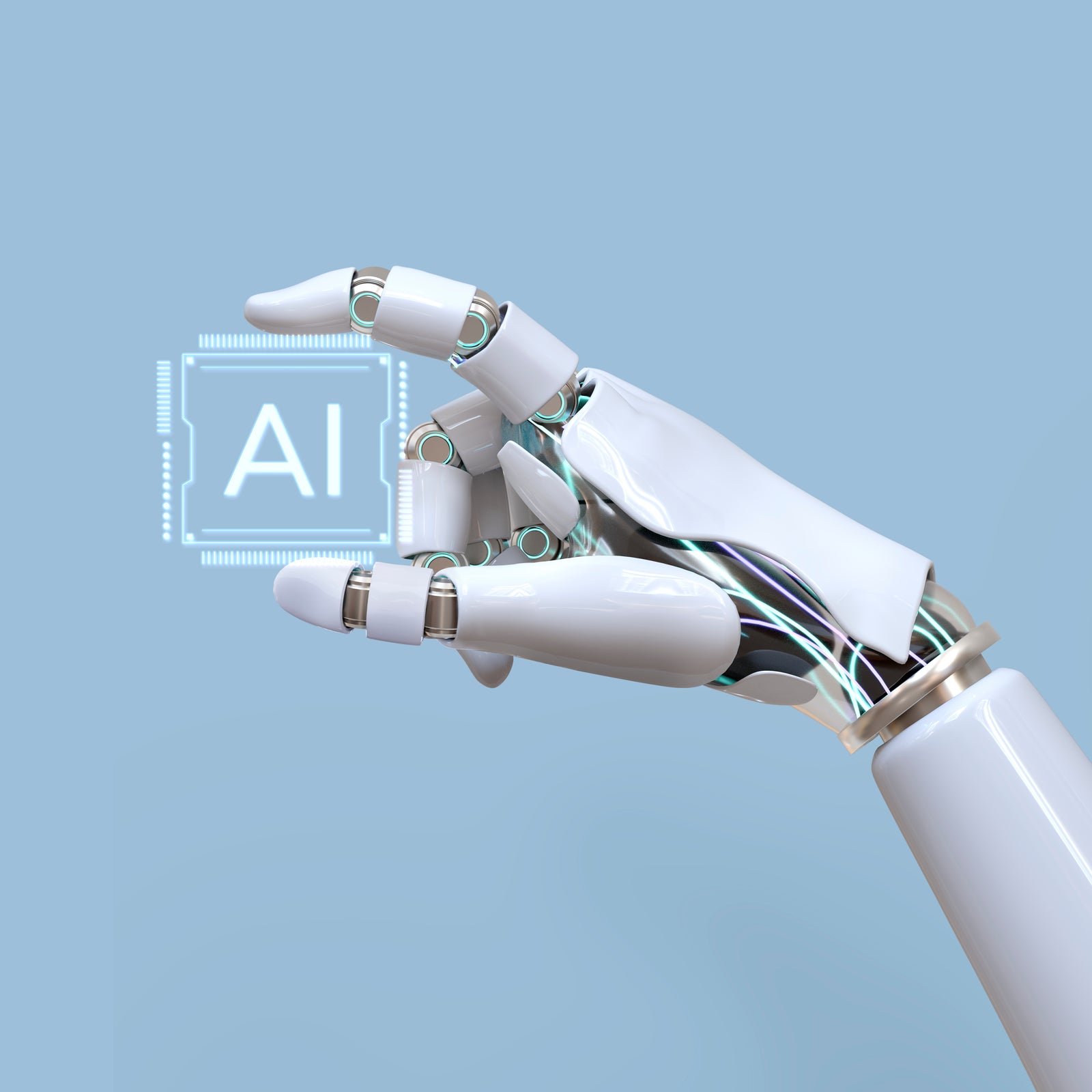The future of healthcare is here, and it's powered by Artificial Intelligence (AI). AI is revolutionizing medicine in ways that were once thought impossible, and the possibilities are endless. In this blog post, we'll explore the growing use cases of AI in healthcare, its impact on healthcare operations, and how it can enhance user experience in healthcare. We'll also dive into the complex world of AI governance in healthcare, including integration challenges, solutions, and ethical considerations. Finally, we'll take a peek into the future landscape of AI in the healthcare ecosystem and how it will transform the workforce and organizations. Join us on this exciting journey as we explore how AI can change the course of healthcare in the next decade!
The Advent of AI in Healthcare Today
The healthcare industry is undergoing a revolution thanks to the advent of artificial intelligence (AI). This transformative technology is reshaping patient care and outcomes in remarkable ways. AI has rapidly expanded its presence in healthcare, leading to significant improvements in medical outcomes across the board.
One of the key areas where AI is making a profound impact is in diagnosis and treatment planning. By leveraging deep learning and data science techniques, AI applications in healthcare are making diagnoses more accurate and treatment plans more effective. Medical professionals can now rely on AI-powered tools to analyze large datasets, identify patterns, and provide valuable insights for clinical practice. This not only saves time but also enhances the quality of patient care.
AI solutions are also streamlining administrative tasks in healthcare organizations, freeing up medical providers and professionals to focus on what matters most – patient care. By automating routine tasks such as scheduling appointments, managing electronic health records, and processing insurance claims, AI is enabling healthcare professionals to dedicate more time and attention to their patients. Furthermore, AI is paving the way for predictive analytics and personalized medicine, offering the potential to transform healthcare by tailoring treatments and interventions based on individual patient needs.
As we move forward, it is crucial to recognize the significant role that AI plays in improving the quality of life for patients and optimizing healthcare systems. Organizations like the World Health Organization, along with research institutions like the Alan Turing Institute, are actively contributing to the development and implementation of AI in healthcare. Through translational research, case studies, and collaborations, the future of AI in healthcare looks promising.

The Growing Use Cases of AI
AI is revolutionizing healthcare in a myriad of ways. One of the growing use cases of AI in healthcare is its role in clinical trials. With the help of artificial intelligence, researchers can now analyze patient data more efficiently and identify valuable trends. This not only saves time but also allows medical professionals to make better-informed decisions regarding treatment options.
Another area where AI is proving to be invaluable is in the analysis of medical images. Machine learning algorithms are being utilized to analyze these images, enabling faster and more accurate diagnosis. This technology has the potential to greatly improve patient outcomes by reducing the time it takes to identify conditions and develop treatment plans.
AI's impact on healthcare goes beyond individual patients. It is also enabling big data analytics, which is crucial for public health research. By uncovering patterns and insights from large datasets, AI is helping researchers understand and address public health issues more effectively.
Furthermore, healthcare organizations are leveraging AI systems to enhance decision making and improve patient outcomes. These systems provide valuable insights that aid in the development of personalized treatment plans, resulting in better overall care.
Lastly, AI is driving drug discovery, significantly accelerating the process of developing new treatments. By utilizing AI algorithms, researchers can analyze vast amounts of data and identify potential drug candidates more efficiently. This not only saves time and resources but also has the potential to transform the pharmaceutical industry.
Overall, the growing use cases of AI in healthcare showcase the transformative power of this technology. From analyzing patient data to improving medical imaging analysis, AI is revolutionizing the healthcare industry one innovation at a time.
Impact of AI on Healthcare Operations
With the integration of artificial intelligence (AI) in healthcare, there has been a significant impact on healthcare operations. AI has been successful in automating various administrative tasks, thereby reducing the need for human resources in data entry processes. Additionally, natural language processing (NLP) techniques are enhancing speech recognition capabilities, which in turn improves clinical documentation. This ensures that healthcare professionals can focus more on patient care rather than spending hours documenting patient records.
Furthermore, AI solutions are optimizing healthcare delivery by improving the efficiency and quality of care provided. By analyzing large amounts of data and utilizing machine learning algorithms, AI is able to identify patterns and trends, enabling medical professionals to make informed decisions. The use of AI in healthcare also leads to improved data quality, which further enhances decision-making processes.
One area where AI has made a significant impact is in transforming medical device data. By leveraging AI algorithms and deep learning techniques, treatment plans can be tailored to individual patients, making them more specific and effective. This not only improves patient outcomes but also contributes to overall cost reduction in healthcare systems.
The adoption of AI in healthcare has opened up new possibilities for improving the quality of life for patients. Researchers are leveraging AI to conduct translational research, and organizations like the World Health Organization are using AI to analyze data and develop better health systems. AI is also being utilized in case studies to understand rare diseases better and provide patients with specific information and treatment options.
In conclusion, the impact of AI on healthcare operations cannot be overstated. From automating administrative tasks to improving data quality and transforming medical device data, AI is revolutionizing the way healthcare is delivered. By leveraging NLP, deep learning, and data science, AI is empowering medical providers and professionals to deliver better, more personalized care to patients, ultimately enhancing the overall healthcare experience.

The Potential of AI in Enhancing User Experience in Healthcare
With the constant advancements in artificial intelligence (AI), the potential for enhancing user experience in healthcare is truly groundbreaking. From improving health monitoring to enabling preventive care and early intervention, AI innovations are revolutionizing the way we approach healthcare. By connecting disparate healthcare data, AI systems provide a comprehensive view of patients, allowing for personalized care and improved patient outcomes. Additionally, AI solutions are making healthcare more accessible by connecting patients with providers remotely, eliminating geographical barriers and ensuring that people receive the care they need.
One area where AI is making a significant impact is medical imaging. Through deep learning algorithms and data science techniques, AI is revolutionizing the way medical images are analyzed and interpreted. This not only allows for more efficient diagnosis but also enables more effective treatment plans. By harnessing the power of AI, medical professionals can make faster and more accurate decisions, ultimately saving lives.
The potential of AI in healthcare extends beyond just individual patient care. AI has the ability to transform healthcare systems as a whole, optimizing operations and improving the overall quality of care. By automating administrative tasks and enhancing clinical documentation through natural language processing, AI streamlines workflows and reduces human resource requirements. This not only saves time but also ensures that healthcare providers can focus on delivering high-quality care to their patients.
In conclusion, the potential of AI in enhancing user experience in healthcare is immense. From improved health monitoring and personalized care to making healthcare more accessible and revolutionizing medical imaging, AI is transforming the way we approach healthcare. As we continue to integrate AI into our healthcare systems, we can expect to see even greater advancements in healthcare delivery and a higher quality of life for patients around the world.
Innovations in Health Monitoring and Preventive Care through AI
In the realm of healthcare, AI is revolutionizing the way we approach health monitoring and preventive care. With the help of AI-powered wearables, vitals can now be monitored continuously, allowing for early detection of health issues before they become critical. Machine learning algorithms are being employed to analyze patient data, enabling the identification of patterns in disease progression. This invaluable information aids in making more accurate diagnoses and developing targeted treatment plans.
AI systems also play a significant role in providing personalized health recommendations that promote preventive care. By leveraging data science and deep learning techniques, these systems can offer tailored advice based on an individual's specific health needs. This proactive approach to healthcare not only improves patient outcomes but also helps in reducing healthcare costs.
Additionally, virtual health assistants utilizing natural language processing (NLP) have emerged as vital resources in the field of healthcare. These assistants are capable of providing medical advice and support, making healthcare more accessible to a larger population. By employing NLP and AI, they can understand and respond to user queries, effectively bridging the gap between medical providers and patients.
Furthermore, AI solutions are enhancing patient engagement and increasing compliance with treatment plans. By incorporating translational research and case studies into their algorithms, these systems can deliver more accurate and relevant information to patients. This not only empowers individuals to take control of their health but also improves their overall quality of life.
The integration of AI in healthcare is transforming the industry, connecting disparate healthcare data and optimizing health systems. As AI continues to evolve, its impact on healthcare operations and patient care will undoubtedly be exponential. With organizations like the World Health Organization and the Alan Turing Institute actively promoting AI innovations in healthcare, we can expect further advancements in this field that will improve the delivery of healthcare services globally.

The Role of AI in Connecting Disparate Healthcare Data
In the ever-evolving field of healthcare, artificial intelligence (AI) is playing a crucial role in connecting disparate healthcare data. By integrating health records, AI is making patient data accessible across various care settings, allowing healthcare providers to have a comprehensive view of their patients' medical history. This seamless integration not only improves efficiency but also enhances the quality of patient care.
One of the key aspects where AI is making a significant impact is through the use of machine learning algorithms. These algorithms have the ability to analyze large datasets, uncovering valuable insights that can be utilized for research purposes. By identifying patterns and trends within the data, researchers and medical professionals can gain a deeper understanding of diseases, leading to more effective treatments and improved patient outcomes.
Moreover, AI systems are driving improvements in data sharing and collaboration among healthcare organizations. Through secure networks and advanced technologies, AI facilitates the seamless exchange of information, enabling healthcare providers to work together more efficiently. This collaborative approach paves the way for enhanced patient care by facilitating accurate and timely decision-making based on a comprehensive understanding of each patient's unique needs.
As AI continues to revolutionize the healthcare industry, it is also ensuring data ethics, protecting patient privacy, and ensuring data security. With advanced algorithms and protocols in place, AI solutions prioritize the confidentiality and integrity of patient information, addressing concerns around privacy and security.
The role of AI in connecting disparate healthcare data is evident. From improving data accessibility and sharing to enabling data-driven decision-making, AI is transforming the way healthcare organizations operate. By harnessing the power of AI, healthcare providers can leverage the vast amount of data available to deliver personalized, efficient, and high-quality care to patients.
Understanding AI Governance in Healthcare
In the realm of AI integration in healthcare, there are several challenges that need to be addressed. These challenges include data access and interoperability, which can hinder the seamless integration of AI solutions into existing health systems. However, the field of data science is making significant advancements in addressing these challenges by developing innovative methods to ensure smooth data flow and compatibility between different healthcare organizations.
Moreover, when it comes to AI in healthcare, ethical considerations play a vital role. It is crucial to protect patient rights and data privacy while deploying AI solutions. Organizations must adhere to strict guidelines and regulations to ensure that AI systems are used responsibly and ethically. The World Health Organization and other regulatory bodies are working towards developing comprehensive AI governance frameworks that will govern the responsible use of AI in healthcare settings.
One of the key concerns in healthcare AI research is the quality of the data used. To overcome this challenge, the use of synthetic data is gaining traction. Synthetic data mimics real patient data while providing privacy protection and ensuring data quality. This approach allows researchers to generate specific information for their studies without compromising patient privacy.
While AI systems can automate and enhance many aspects of healthcare, they still require human oversight to ensure patient safety and quality of care. Human intervention is necessary to interpret and validate the outputs generated by AI algorithms. Additionally, healthcare professionals play a critical role in implementing and integrating AI-driven technologies into clinical practice.
By understanding and addressing these challenges, we can pave the way for AI to revolutionize healthcare. AI governance frameworks, synthetic data, and human oversight will collectively contribute to the responsible and effective implementation of AI in healthcare organizations, ultimately improving patient outcomes and quality of life.
AI Integration Challenges and Solutions
Integrating AI in healthcare comes with its fair share of challenges and complexities. One of the key requirements for successful integration is interoperability with existing healthcare systems. AI solutions must seamlessly work alongside these systems to ensure a smooth workflow and efficient patient care.
To achieve accurate and reliable outcomes, AI solutions need to address data quality issues. This involves ensuring that the data used for training and analysis is of high quality, free from errors or biases. Using advanced data science techniques, such as deep learning, can help improve the quality of data and enhance the performance of AI algorithms.
Standardized data formats and protocols play a vital role in facilitating AI integration in healthcare. By utilizing common standards, healthcare providers can easily share and exchange data with AI systems, enabling seamless collaboration and knowledge sharing. Organizations like the World Health Organization and healthcare organizations worldwide are working on establishing these standardized formats to promote interoperability and simplify the integration process.
Collaboration between healthcare providers and AI developers is crucial for overcoming integration challenges. By working together, medical professionals and AI experts can combine their knowledge and expertise to develop tailor-made solutions that meet the specific needs of healthcare organizations. Close collaboration can also ensure that AI solutions are scalable, adaptable, and cost-effective, making them suitable for widespread adoption in healthcare settings.
In conclusion, integrating AI into healthcare comes with its set of challenges, but they can be overcome through interoperability, data quality improvements, standardization efforts, and collaboration between healthcare providers and AI developers. By addressing these challenges head-on, the healthcare industry can harness the power of AI to revolutionize patient care, improve health outcomes, and enhance the quality of life.

Ethical Considerations in AI Deployment
In the rapidly evolving field of AI in healthcare, ethical considerations play a crucial role in ensuring the responsible and equitable deployment of artificial intelligence. To realize the full potential of AI applications, principles of transparency, fairness, and accountability must be upheld. Patient consent and data privacy are paramount in AI deployment, as healthcare organizations must safeguard sensitive information while leveraging the power of AI systems. By designing AI systems to avoid bias and discrimination, we can promote equitable healthcare outcomes for all patients, regardless of their background or medical history.
To navigate the ethical complexities of AI deployment in healthcare, it is imperative to establish robust frameworks for ethical decision-making. These frameworks can guide medical providers and professionals in making informed choices that prioritize patient well-being and protect their rights. Additionally, continuous monitoring of AI systems is essential to mitigate risks and ensure patient safety. By closely monitoring the performance and impact of AI algorithms, healthcare organizations can identify any potential issues and take proactive measures to address them.
AI in healthcare holds immense promise, but it also comes with the responsibility to address ethical considerations and promote patient-centered care. By adhering to ethical principles, healthcare organizations can harness the potential of AI to revolutionize medicine while maintaining trust and accountability. Through collaboration between industry stakeholders, regulatory bodies, and organizations like the World Health Organization, we can collectively shape the future of healthcare, where AI integrates seamlessly into clinical practice, improves quality of life, and brings healthcare access to underserved populations.
The Future Landscape of AI in the Healthcare Ecosystem
The future of healthcare is being shaped by the relentless advancements in artificial intelligence (AI). As AI continues to revolutionize the field, it is driving innovation and transforming the healthcare ecosystem. The use of AI in healthcare is becoming more widespread, leading to improved patient outcomes and better overall quality of life.
One of the key areas where AI is making a significant impact is in disease prevention, early detection, and treatment. AI systems are capable of analyzing vast amounts of data, including medical records, research papers, and case studies, to identify patterns and trends that may go unnoticed by human clinicians. This ability enables AI solutions to detect diseases at an earlier stage, potentially saving lives and improving treatment outcomes.
Moreover, AI in healthcare is enabling the concept of personalized medicine. By leveraging deep learning algorithms and data science techniques, AI systems can tailor treatment plans to individual patients based on their specific information, medical history, and genetic makeup. This level of personalization not only improves the effectiveness of treatments but also ensures that patients receive the most appropriate care for their unique conditions.
The World Health Organization recognizes the potential of AI in transforming health systems across the globe. AI-powered technologies have the potential to bridge gaps in healthcare access, especially in remote areas or regions with limited resources. By providing virtual consultations, remote monitoring, and even diagnosis of certain conditions, AI can extend the reach of medical professionals and improve access to healthcare for underserved populations.
In addition to improving patient care, AI is also helping healthcare organizations streamline their operations and reduce costs. By automating routine administrative tasks, such as appointment scheduling and medical billing, AI frees up valuable time for medical providers to focus on delivering quality care. Furthermore, AI can enhance clinical practice by recommending evidence-based treatment options, reducing errors, and assisting in translational research.
As we look ahead to the future, it is clear that AI will continue to play a pivotal role in transforming the healthcare landscape. With its ability to drive innovation, improve patient outcomes, and enable personalized medicine, AI has the potential to revolutionize healthcare and make a significant positive impact on the lives of millions. Embracing AI in healthcare is not just a possibility but a necessity in this rapidly evolving digital age.
How AI is Set to Transform Healthcare Workforce and Organizations
The integration of artificial intelligence (AI) in healthcare is set to revolutionize the way the healthcare workforce operates and transform healthcare organizations. AI has the potential to automate administrative tasks, allowing healthcare professionals to shift their focus towards providing more personalized patient care. By leveraging AI technology, healthcare organizations can harness the power of big data to analyze vast amounts of information and uncover valuable insights. This enables them to identify patterns, predict outcomes, and make data-driven decisions that can improve overall healthcare delivery.
One of the significant impacts of AI in healthcare is its ability to provide personalized treatment plans based on clinical data and predictive analytics. By analyzing patient data and utilizing deep learning algorithms, AI solutions can generate tailored recommendations for treatment options, leading to improved patient outcomes and enhanced quality of life. Additionally, AI applications such as natural language processing, speech recognition, and medical image analysis can assist healthcare workers in making accurate and timely diagnoses. These technologies bridge the gap between data and clinical practice, supporting medical professionals in their decision-making process.
The application of AI in healthcare also holds the promise of lowering healthcare costs and optimizing the efficiency of healthcare delivery. By automating routine tasks, healthcare organizations can streamline their operations, reducing the burden on the healthcare workforce and improving resource allocation. Furthermore, AI can help identify areas of waste and inefficiency within healthcare systems, enabling healthcare organizations to implement targeted interventions and optimize cost-effectiveness.
In conclusion, AI is poised to make a significant impact on the healthcare workforce and organizations by automating tasks, enabling data-driven decision-making, improving patient outcomes, and reducing healthcare costs. Through the integration of AI technologies, healthcare professionals can shift their focus towards providing personalized care while leveraging the power of data to deliver efficient and effective healthcare services. The future of healthcare is being transformed by AI, and its potential for driving innovation and advancements in the field is truly exciting.
How Can AI Change the Course of Healthcare in the Next Decade?
The potential of AI in healthcare is immense. It can revolutionize drug discovery, analyze patient data for precise treatment plans, improve collaboration among healthcare providers, address data ethics concerns, and enhance disease detection through medical imaging. AI has the power to reshape healthcare in the coming decade.
Conclusion
In conclusion, the advent of AI in healthcare has revolutionized the field, offering numerous benefits and opportunities for improvement. From enhancing user experience to streamlining healthcare operations, AI has proven to be a game-changer. Innovations in health monitoring and preventive care, as well as the ability to connect disparate healthcare data, have paved the way for more personalized and efficient patient care. However, it is important to address the challenges of AI integration and ethical considerations to ensure responsible and effective deployment. Looking ahead, AI is set to transform the healthcare workforce and organizations, shaping the future landscape of healthcare in the next decade. Exciting times lie ahead as we harness the power of AI to revolutionize medicine and improve the lives of patients worldwide.
References:
A guide to good practice for digital and data-driven health technologies
How Artificial Intelligence is Revolutionizing Drug Discovery
MRC Laboratory of Medical Sciences (LMS)
An automated health care system that understands when to step in
The potential for artificial intelligence in healthcare
No longer science fiction, AI and robotics are transforming healthcare





Leave a comment (all fields required)